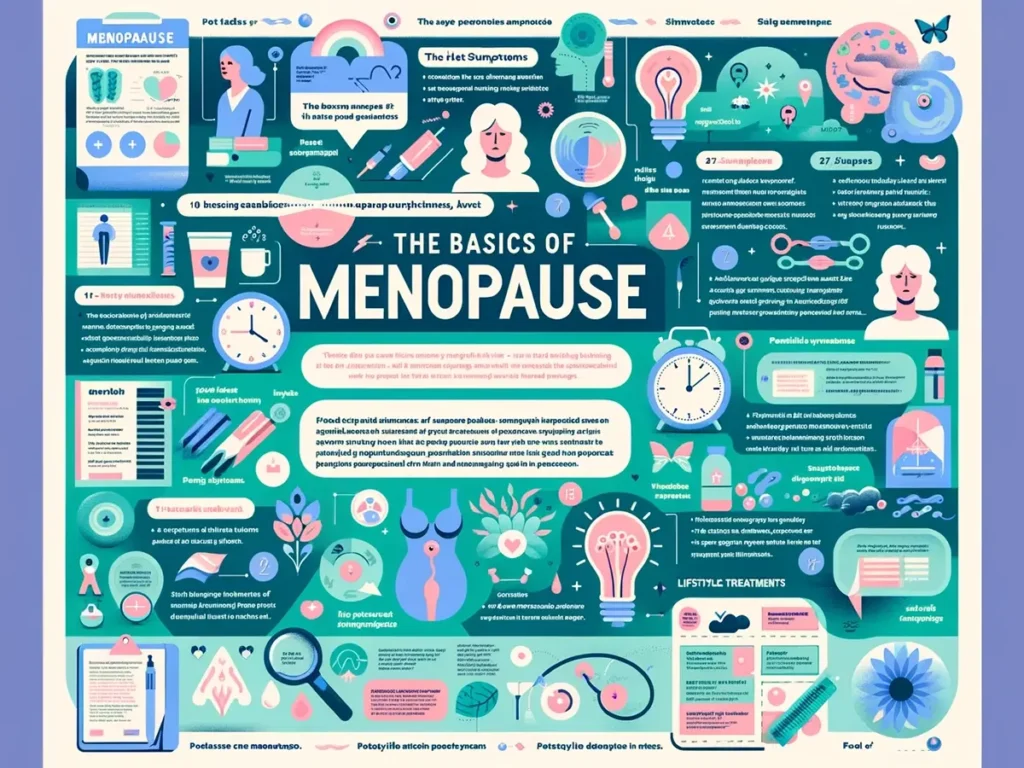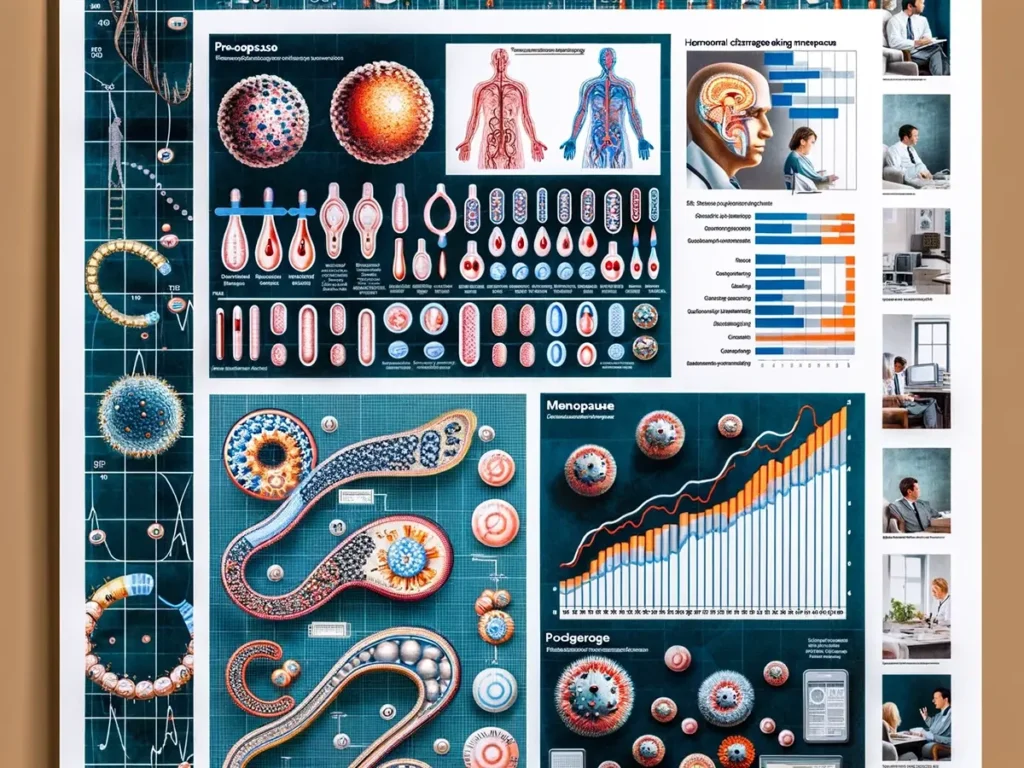Perimenopause, or the transition to menopause, typically occurs in a woman’s 40s or 50s. However, early menopause, also known as premature menopause, can happen before the age of 40 and bring about a host of physical and emotional changes. In this blog post, we delve into the potential causes and implications of early menopause, shedding light on this lesser-known aspect of women’s health.
Key Takeaways:
- Early Menopause Can Be Caused By Various Factors: Early menopause can be caused by genetics, autoimmune diseases, certain medical treatments, and lifestyle factors.
- Potential Health Implications: Early menopause can lead to an increased risk of osteoporosis, heart disease, and other health issues due to the decrease in estrogen levels at a younger age.
- Consult a Healthcare Provider: If you are experiencing symptoms of early menopause or are concerned about your reproductive health, it is important to consult a healthcare provider for proper evaluation and management.
Understanding Menopause
Obviously, menopause is a natural biological process that marks the end of a woman’s reproductive years. It is defined as the absence of menstrual periods for 12 consecutive months, indicating the end of the menstrual cycle and fertility.
Normal Menopause Physiology
To understand menopause, it’s essential to grasp the physiological changes that occur in a woman’s body during this time. As women age, their ovaries produce less estrogen and progesterone, the hormones that regulate the menstrual cycle and fertility. This decline in hormone levels leads to the cessation of ovulation and menstruation, resulting in menopause.
During menopause, women may experience symptoms like hot flashes, night sweats, mood changes, and vaginal dryness due to hormonal fluctuations. These symptoms vary in severity and duration among individuals but are considered a normal part of the menopausal transition.
Timeline of Menopausal Changes
For many women, the journey through menopause is divided into three stages: perimenopause, menopause, and postmenopause. Perimenopause, also known as the menopausal transition, typically begins in a woman’s 40s but can start earlier. During this stage, hormonal fluctuations can cause irregular periods and menopausal symptoms.
Menopause is officially reached when a woman has gone 12 consecutive months without a menstrual period. Postmenopause follows menopause and refers to the years after menopause. Women in postmenopause are at an increased risk of certain health conditions like osteoporosis and heart disease due to hormonal changes.
Menopausal changes can have a significant impact on a woman’s overall health and quality of life. It’s important for women to be aware of these changes and seek proper medical guidance and support during this transition period.
Risk Factors for Early Menopause
Any woman can experience early menopause, which is defined as menopause occurring before the age of 40. While there is no definitive cause for early menopause, several risk factors have been identified that may increase the likelihood of its occurrence. Understanding these risk factors can help women take proactive steps to manage their health and well-being.
Genetic Factors
To elucidate the role of genetic factors in early menopause, researchers have identified specific gene variations that may be linked to a higher risk of experiencing menopause at a younger age. These genetic factors can be inherited from one’s parents and may contribute to the premature depletion of ovarian follicles, leading to early menopause.
- Family history of early menopause
- Specific gene variations associated with ovarian function
- Presence of certain autoimmune disorders
After ruling out other potential causes of premature menopause, genetic testing may be recommended for women with a family history of early menopause or those experiencing unexplained reproductive issues.
Lifestyle and Environmental Factors
The environment and lifestyle choices can also play a significant role in the onset of early menopause. Factors such as smoking, exposure to toxins, and extreme weight loss or exercise habits can impact ovarian function and contribute to the premature depletion of eggs.
- Smoking and exposure to secondhand smoke
- Prolonged exposure to chemicals or toxins
- Extreme weight loss or intense exercise routines
The interplay between lifestyle and environmental factors with genetic predispositions can influence the timing of menopause in women. It’s important for women to be aware of how their choices and surroundings can affect their reproductive health.
Medical Conditions Linked to Early Menopause
Your body is a complex system, and several medical conditions can contribute to early menopause. Understanding these conditions can help shed light on the potential causes and implications of premature ovarian failure.
Autoimmune Disorders
For some women, autoimmune disorders such as thyroiditis, rheumatoid arthritis, and lupus can be linked to early menopause. These conditions occur when the immune system mistakenly attacks the body’s tissues, including the ovaries. This can lead to inflammation and damage that impacts ovarian function, causing menopause to occur earlier than expected.
It is essential for women with autoimmune disorders to work closely with their healthcare providers to monitor their hormone levels and ovarian function regularly. Early detection and treatment can help manage the symptoms of early menopause and preserve fertility options if desired.
Chromosomal Irregularities
On rare occasions, chromosomal irregularities such as Turner syndrome or Fragile X syndrome can lead to early menopause. These genetic conditions can cause abnormalities in the development of the ovaries, resulting in premature ovarian failure and the onset of menopause before the age of 40.
Irregularities in the chromosomes can disrupt the normal processes of ovarian function, impacting hormone production and fertility. Genetic testing can help diagnose these conditions early, allowing for appropriate medical interventions and family planning considerations.
Surgical Procedures and Treatments
Disorders of the reproductive system, such as endometriosis or ovarian cysts, can sometimes require surgical intervention that affects ovarian function. Surgeries like oophorectomy, where one or both ovaries are removed, can induce early menopause. Additionally, treatments like chemotherapy or radiation therapy for cancer can also damage the ovaries and lead to premature ovarian failure.
Medical advancements have enabled healthcare providers to explore options like ovarian tissue cryopreservation before undergoing treatments that may impact fertility. It’s crucial for women facing surgical procedures or treatments that may affect ovarian function to discuss potential implications on menopause with their healthcare team.
Symptoms and Early Signs
Unlike natural menopause, early menopause can catch individuals off guard with its sudden onset of symptoms. It’s important to recognize the signs so that appropriate steps can be taken. Early signs of menopause can vary between individuals, but there are common symptoms to look for.
Physical Symptoms
An early sign of menopause can be irregular periods, which may come more frequently or become sparse. Hot flashes and night sweats are also common symptoms that can disrupt sleep and daily activities. Vaginal dryness and discomfort during intercourse may also occur, leading to decreased libido and potential relationship strains.
Other physical symptoms of early menopause can include fatigue, joint pain, and weight gain. Loss of bone density due to decreased estrogen levels can lead to osteoporosis, making individuals more prone to fractures and other bone-related issues. Changes in skin texture and hair thickness can also be noticeable during this transitional phase.
Psychological Implications
Symptoms of early menopause aren’t limited to physical changes; psychological implications can also manifest. Mood swings, irritability, anxiety, and depression can be part of the hormonal fluctuations experienced during this time. Cognitive changes such as memory lapses and difficulty concentrating may also be present, impacting daily functioning.
Recognizing and addressing the psychological implications of early menopause is crucial for overall well-being. Seeking support from healthcare providers, therapists, or support groups can help individuals navigate these emotional challenges and develop coping strategies. It’s essential to prioritize self-care and mental health during this transitional period.
Diagnosing Early Menopause
For women experiencing symptoms of early menopause, a proper diagnosis is crucial to understand the underlying causes and implications for their health. Diagnosing early menopause typically involves a combination of medical history assessments, physical examinations, and laboratory tests.
Medical History and Physical Examination
An in-depth medical history review is essential in diagnosing early menopause. Your healthcare provider will discuss your menstrual patterns, symptoms, family history, and overall health. Additionally, a physical examination may be conducted to assess signs of hormonal changes such as changes in breast tissue or the presence of other physical symptoms.
Laboratory Tests and Diagnostic Criteria
Diagnosing early menopause often involves laboratory tests to measure hormone levels, such as follicle-stimulating hormone (FSH), luteinizing hormone (LH), and estradiol. These tests can help confirm hormonal imbalances associated with menopause. In some cases, additional tests like thyroid function tests may be recommended to rule out other potential causes of symptoms.
For instance, the diagnostic criteria for early menopause include the presence of menopausal symptoms before the age of 40, along with consistently elevated FSH levels and low estradiol levels. These criteria help healthcare providers differentiate early menopause from other conditions that may present with similar symptoms.
Managing Early Menopause
Now that you have been diagnosed with early menopause, it’s important to explore the various management strategies available to you. Managing early menopause involves addressing the symptoms and potential long-term health implications associated with this condition.
Hormone Replacement Therapy
For many women experiencing early menopause, hormone replacement therapy (HRT) is a common treatment option. HRT involves the use of medications containing hormones such as estrogen and progesterone to help alleviate menopausal symptoms like hot flashes, night sweats, and vaginal dryness. It can also help protect against bone loss and reduce the risk of heart disease. However, it’s important to discuss the risks and benefits of HRT with your healthcare provider, as it may not be suitable for everyone.
An alternative to traditional HRT is bioidentical hormone therapy, which uses hormones that are chemically identical to those produced by the body. Some women find this option more appealing due to its natural composition, but it’s essential to consult with a healthcare professional before starting any hormone replacement regimen to ensure it is safe and effective for your specific needs.
Alternative Treatments and Lifestyle Changes
Plus, there are alternative treatments and lifestyle modifications that can help manage the symptoms of early menopause. Incorporating practices such as acupuncture, yoga, and mindfulness meditation can assist in reducing stress and improving overall well-being. Additionally, maintaining a healthy diet rich in fruits, vegetables, whole grains, and lean proteins can support hormone balance and alleviate menopausal symptoms.
Coping with Fertility Implications
Lifestyle adjustments, such as regular exercise, quitting smoking, and limiting alcohol intake, can also contribute to managing the effects of early menopause on fertility. Counseling and support groups can provide emotional support during this challenging time. Furthermore, discussing fertility preservation options with a reproductive specialist can help you explore potential avenues for future family planning, such as egg freezing or embryo preservation.
It’s crucial to remember that each woman’s experience with early menopause is unique, and the management approach may vary accordingly. By working closely with healthcare providers and making informed decisions about treatment options, women can effectively navigate the challenges associated with early menopause and maintain a high quality of life.
Prevention and Risk Reduction
Despite early menopause being a complex and multifaceted issue, there are steps that can be taken to potentially prevent or reduce the risk of early onset. Understanding the potential causes and risk factors can empower individuals to make informed decisions about their health and lifestyle choices.
Potential for Preventive Measures
To address the potential for preventive measures, it is important to focus on maintaining a healthy lifestyle. Regular exercise, a balanced diet rich in nutrients, and managing stress levels can all play a significant role in promoting overall reproductive health. Avoiding smoking, excessive alcohol consumption, and exposure to environmental toxins can also help reduce the risk of early menopause.
Furthermore, staying proactive about reproductive health by regular check-ups with healthcare providers can help monitor any changes or abnormalities that may indicate early menopause. Early detection and intervention can sometimes help manage symptoms and delay the onset of menopause.
Current Research and Future Directions
Future research in the field of early menopause aims to delve deeper into understanding the genetic, environmental, and lifestyle factors that contribute to its onset. By studying large populations over extended periods of time, researchers hope to identify new markers and potential preventive strategies.
Potential breakthroughs in the areas of hormone therapy, fertility preservation, and personalized medicine could revolutionize the way early menopause is approached and managed in the future. Collaborative efforts between scientific communities and healthcare providers hold promise for advancing our knowledge and improving outcomes for individuals at risk of early menopause.
Conclusion
Presently, early menopause can be caused by a variety of factors ranging from genetics to lifestyle choices. By understanding these potential causes, individuals can make informed decisions to potentially delay the onset of menopause. Consulting with a healthcare provider is crucial for those experiencing early menopause symptoms, as they can provide guidance on treatment options and potential implications for overall health.
It is essential for individuals to educate themselves about early menopause to better understand its potential impact on their lives. By staying informed and proactive, individuals can take control of their health and well-being, potentially mitigating the effects of early menopause on their quality of life. Don’t hesitate to seek help and guidance if you suspect you are experiencing early menopause, as early detection and management can make a significant difference in maintaining overall health.
FAQ
Q: What is early menopause?
A: Early menopause, also known as premature ovarian failure, occurs when a woman stops menstruating and experiencing other symptoms of menopause before the age of 40.
Q: What are the potential causes of early menopause?
A: Early menopause can be caused by factors such as genetic predisposition, autoimmune disorders, chemotherapy or radiation therapy, smoking, and certain medical conditions like Turner syndrome or Fragile X syndrome.
Q: What are the implications of early menopause on a woman’s health?
A: Early menopause can increase the risk of osteoporosis, heart disease, and cognitive decline. It can also affect fertility and emotional well-being.
Q: How is early menopause diagnosed?
A: Early menopause can be diagnosed through a combination of symptoms, blood tests to check hormone levels, and possibly imaging tests to assess ovarian function.
Q: Can early menopause be treated?
A: While early menopause cannot be reversed, symptoms can be managed through hormone replacement therapy, lifestyle changes, and medications to prevent complications like osteoporosis and heart disease.






